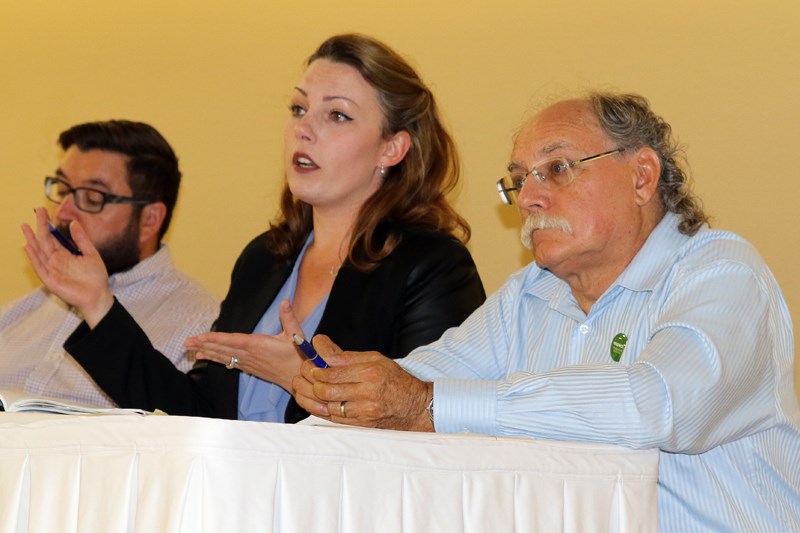THUNDER BAY – Storm water infrastructure is a top priority for Northwood and McKellar ward councillors and they’re calling on their constituents to help make it a priority in next year’s municipal budget.
Three months after 33 to 92 millimetres of rain splashed across the city over a single day, Northwood Coun. Shelby Ch’ng and McKellar Coun. Paul Pugh called homeowners affected by this summer’s downpour to a joint ward meeting at the Slovak Legion on Wednesday.
Ch’ng owns three properties in the ward and counted herself among those who were unexpectedly mopping after the June 25 storm.
She’s feeling what she called “almost all-encompassing” pressure to deliver a zero-per-cent tax increase in the city’s 2017 budget and she urged flood victims to make themselves heard.
“I tell everybody, if you want something in the budget, if this is your passion, if you want your home protected, it’s not just a given that people are going to vote for it. You need seven votes for anything to pass at council,” Ch’ng said.
“If this is an important issue for you, I need to see you at council. I need you to stand behind me because an elected official is only as good as its electorate.”
Over 100 residents whose homes had flooded in either the 2012 or 2016 storms attended the meeting, most of whom lived in Northwood or McKellar wards.
Northwood resident Valerie Cameron has been organizing her neighbourhood since the 2012 flood. She has made the case for better stormwater infrastructure in several deputations to council, arguing inaction on the file will cost the city even more.
“We shouldn’t have to tell them each budget year to fix our flooding,” she told the crowd.
“Why do we have to keep doing this when it’s a known fact that we’re vulnerable? Why do we have to keep putting the pressure on? The pressure should be there. They should know and it should be a priority.”
Pugh estimates he has stood in 500 of his constituents’ flooded basements. As climate change makes extreme weather events increasingly unpredictable, water drainage remains a high priority for his ward but he insisted the issue is complex.
“The city wasn’t built for this,” he said.
“It was not designed to handle these sorts of things and we’re scrambling. We’re scrambling very much. We heard from staff tonight on what they’re trying to do to remediate the worst effects of these storms but I can’t look people in the eye and say we’re going to have a short-term solution because we’re not.”
Pugh said drainage constructed to 1970s’ standards was built with five-year storms in mind. The June 25 flood was a 100-year storm; an odds-defying weather event that should only occur once a century and has a one per cent chance of happening in any given year. The last such storm struck only four years prior.
“I would suggest we stop calling them 100-year events if it’s going to happen every four years in the last 12,” said Ontario Street resident Stephanie Pesheau.
After water levels in Pesheau’s home nearly rose to the four-foot level of her light switches in the 2012 flood, she was certain her family had done everything they could to stay dry.
They graded the foundation a metre away from their home and installed a weeping tile system equipped with two sump pumps and two ditch pumps. An engineer’s inspection showed no cracks in the walls or floor.
By the time the rain let up on June 26, a foot of water filled their basement and the sudden pond in the yard made Pesheau’s car floor “squishy” by morning.
She came to the meeting to ask city employees what more she could possibly do.
“We were contemplating the idea of moving our toddler into the basement and that’s something a lot of families have to think about: what would have happened if she was down there?” she asked.
“It’s very scary to think about but that’s something parents have to think about in that area. Where are your children going to live if you stay in this ward that isn’t being upkept?”
City project engineer Brian Newman told the crowd no municipality has enough money to constantly re-engineer its environment. He also argued local streets don’t have enough space to build sufficient drainage for regular storms of this magnitude.
He wasn’t surprised to hear stories from Pesheau and her neighbours, some of which asked whether they should simply move elsewhere.
“When I started with the city in 2002, my honest opinion was, buy that whole area up, bulldoze it, turn it into Wal-Mart level land and make it light industrial/commercial. At the time, it was 100 households at $100,000 each, that’s $10 million. We’ve spent that already,” he said.
“There’s people here, I recognize them, who were offended I said that but I didn’t say it to offend them. We’re dealing with problems that aren’t easily dealt with. From my perspective, maybe that was the wrong attitude because people do love living there but there’s an economic side to everything.”
